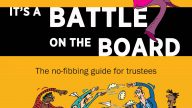Governance, Leadership, Policy
In a year of toxic political rhetoric, outspoken allies are more vital than ever
We must ask ourselves how often we leave those under attack to defend themselves without demonstrating our support.
I was once in a meeting where I called out someone for using inappropriate language. They got very upset and turned on me. That was OK, maybe I didn’t phrase it well.
But what really got to me was that no one backed me up. I was left feeling isolated and fearful of speaking up in future.
Afterwards some folk did say that I was right for pointing it out, but that didn’t help because whispered allyship is not meaningful. It smacks of virtue signalling.
Committed allies speak up – and at a time when so many of our fellow charities are subjected to abuse, ridicule and attack because of manufactured culture wars, outspoken allyship is needed more than ever.
When the National Trust was being attacked or the RNLI was under fire for simply saving lives, did other charities step up and publicly support them?
When refugee and asylum-seeker charities are accused of subverting the law for leftist agendas, or criminal justice charities of actively working to keep violent criminals on the streets – how many of our charities keep their heads down?
We must ask ourselves how often we leave those under attack to defend themselves without demonstrating our support. Does the world know that we are on their side and that we stand together for what is right, even if it is not our cause that is being maligned?
I understand the fear. We won’t be attacked if we can just keep our heads down and not get noticed.
But is that really OK? Do we want to be part of a sector that thinks “I’m alright, Jack. Your problem is not my problem”?
And what happens when we are the ones that need the support – if we have not stood up for others, why on earth would they stand up for us?
In an election year political rhetoric becomes even more toxic. We will undoubtedly see more culture war attacks on good and decent charities that are simply doing the work they were set up to do.
Although there are many things we don’t agree on as a sector, there are more things on which we align.
We agree that we should be allowed to do the work we were set up to do, provided it is within the law and our objects. We agree that charities should be able to campaign to make life better for those they serve. We agree that ugly, divisive rhetoric does not serve citizens or communities.
In fairness to the sector, we are often quiet not just because of a fear of being dragged into a spat (although that is a genuine concern), but also because we have so many other things to do.
But I don’t believe we can keep quiet, this year of all years. I think we need to step in and speak up for our fellow charities’ right to do their work whether folk agree with their cause or not.
This is particularly true for those of us who are bigger, stronger and have louder voices and a more obvious presence.
When I needed an ally, no one was there for me. I admit to being more fearful since. Let’s be true allies now and stand up for each other.
This article was originally published on the Third Sector website, take a look here.


